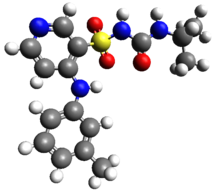Torasemide
Appearance
 | |
 | |
| Clinical data | |
|---|---|
| Trade names | Demadex ,Tortas |
| AHFS/Drugs.com | International Drug Names |
| MedlinePlus | a601212 |
| Routes of administration | Oral, IV |
| ATC code | |
| Legal status | |
| Legal status |
|
| Pharmacokinetic data | |
| Bioavailability | 80-90% |
| Protein binding | Highly bound (>99%). |
| Metabolism | Hepatic (80%) |
| Elimination half-life | 3.5 hours; Cirrhosis: 7-8 hours |
| Identifiers | |
| |
| CAS Number | |
| PubChem CID | |
| IUPHAR/BPS | |
| DrugBank | |
| ChemSpider | |
| UNII | |
| KEGG | |
| ChEBI | |
| ChEMBL | |
| CompTox Dashboard (EPA) | |
| ECHA InfoCard | 100.164.924 |
| Chemical and physical data | |
| Formula | C16H20N4O3S |
| Molar mass | 348.421 g/mol g·mol−1 |
| 3D model (JSmol) | |
| |
| |
| | |
Torasemide (rINN) or torsemide (USAN) is a pyridine-sulfonyl urea type loop diuretic mainly used in the management of edema associated with congestive heart failure. It is also used at low doses for the management of hypertension. It is marketed under the brand names Demadex, Diuver, and Examide.
Compared with other loop diuretics, torasemide has a more prolonged diuretic effect than equipotent doses of furosemide and relatively decreased potassium loss. No evidence of torasemide-induced ototoxicity has been demonstrated in humans.[1]
Recent publications suggest improved outcomes when used for heart failure compared with furosemide.[2][3][4]
References
- ^ Dunn CJ, Fitton A, Brogden RN (January 1995). "Torasemide. An update of its pharmacological properties and therapeutic efficacy". Drugs. 49 (1): 121–42. doi:10.2165/00003495-199549010-00009. PMID 7705212.
- ^ Roush GC, Kaur R, Ernst ME (2014). "Diuretics: a review and update". J. Cardiovasc. Pharmacol. Ther. 19 (1): 5–13. doi:10.1177/1074248413497257. PMID 24243991.
- ^ Buggey J, Mentz RJ, Pitt B, Eisenstein EL, Anstrom KJ, Velazquez EJ, O'Connor CM (2015). "A reappraisal of loop diuretic choice in heart failure patients". Am. Heart J. 169 (3): 323–33. doi:10.1016/j.ahj.2014.12.009. PMC 4346710. PMID 25728721.
- ^ Mentz RJ, Hasselblad V, DeVore AD, Metra M, Voors AA, Armstrong PW, Ezekowitz JA, Tang WH, Schulte PJ, Anstrom KJ, Hernandez AF, Velazquez EJ, O'Connor CM (2016). "Torsemide Versus Furosemide in Patients With Acute Heart Failure (from the ASCEND-HF Trial)". Am. J. Cardiol. 117 (3): 404–11. doi:10.1016/j.amjcard.2015.10.059. PMC 4718787. PMID 26704029.
External links
- Medlineplus drug information: Torsemide (Systemic) – information from USP DI Advice for the Patient
